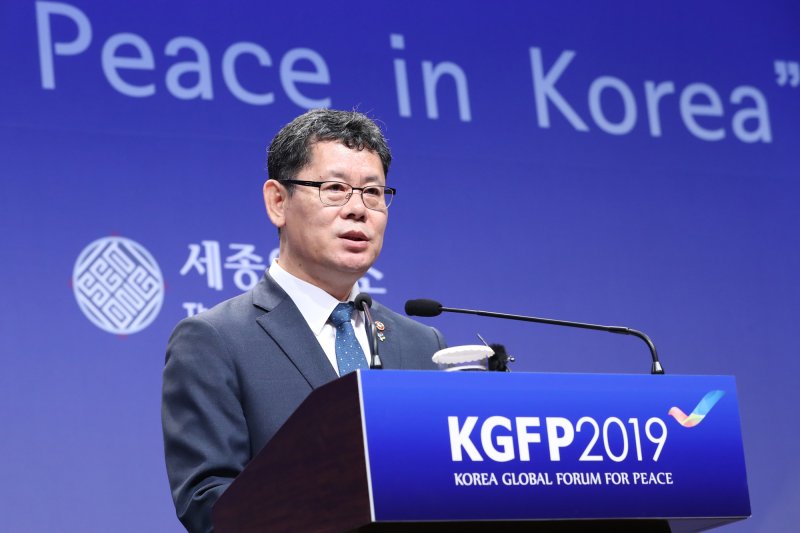1 of 2 | South Korean Unification Minister Kim Yeon-chul said a conference Monday that he expects denuclearization talks to resume between the United States and North Korea. File Photo by Yonhap
SEOUL, Sept. 23 (UPI) -- The South Korean government "will not just sit on [its] hands" regarding relations with North Korea, Minister of Unification Kim Yeon-chul said Monday, vowing to "leverage various opportunities to resume inter-Korean relations."
Kim gave the keynote speech commemorating the 30th anniversary of the University of North Korean Studies, just hours before South Korean President Moon Jae-in was scheduled to meet with U.S. President Donald Trump about North Korea and denuclearization in New York.
In Seoul, analysts and scholars huddled to discuss security, peace and denuclearization on the Korean Peninsula. The mood, though sobered by a lack of recent diplomatic progress, seemed somewhat optimistic.
During his speech, Kim brought up several accomplishments scored by the United States and South Korea during its diplomatic run with the North, including the shutdown of loudspeaker propaganda and several guard posts within the Demilitarized Zone, the construction of a new DMZ peace trail and the repatriation of U.S. soldier remains.
"It has opened up rare and valuable turning points in the process toward denuclearization on the Korean Peninsula," Kim said through an interpreter. "But of course, there have been regrets."
Much of Kim's speech focused on the future of inter-Korean relations during a diplomatic standstill.
"I expect this assembly [between Trump and Moon] to be a stepping stone in resuming denuclearization talks between North Korea and the U.S.," Kim added. "We need to make proactive efforts and [have a] strong drive."
Reviving relations
Experts and analysts are calling for a revival in nuclear talks between Pyongyang and Washington, but doing so won't be easy, they said.
The rapid growth in diplomatic relations between North Korea, South Korea and the United States came to an abrupt slowdown after Trump walked out of the Hanoi, Vietnam summit in February over disagreements on economic sanctions. The summit ended before the two leaders could even have lunch.
Since then, South Korea has mostly gotten the cold shoulder from North Korea -- and Kim Jong Un's regime has gone back to provocative short-range missile tests while simultaneously requesting another summit with Trump.
"The United States is not doing great diplomacy right now," Carla P. Freeman, executive director of the Johns Hopkins SAIS Foreign Policy Institute, said at Monday conference in Seoul. "The president's summitry may have been too much too soon, and it's difficult to backtrack from that."
Part of the problem is that Moon, Kim Jong Un and Trump have yet to write out a list of trust-building measures that would lead to denuclearization. North Korea wants some sanctions against it lifted in return for the concessions it has already made, while the United States has repeatedly suggested that it wants total denuclearization first.
"The U.S. is going to have to be more realistic or set some clear goals for what it can accept in terms of improving its interactions with North Korea and making some headway toward denuclearization," Freeman said.
Trump's ongoing trade war with China might also be contributing to greater destabilization of East Asian security by alienating Beijing from Washington, Freeman said. As it is, the trade war is arguably straining the United States' key ally, South Korea, which faces fear of economic fallout if the spat continues to escalate.
"The trade friction between the two countries has spilled over in the security arena ... China, in recent months, has grown closer to North Korea," Freeman said. "I'm hopeful that what China is doing is not forging and strengthening its military alliance, but rather reassuring North Korea and providing additional incentives to negotiate."
"It is very essential to have international cooperation, and particularly from our surrounding so-called 'four major powers' -- the U.S. China, Japan and Russia," Lee Su-hoon, a professor at Kyungnam University and the former South Korean ambassador to Japan, said at the conference.
Uncertain future
It's unclear what Moon and Trump's New York summit will mean for future talks with North Korea, and some experts whether the entire diplomatic process will reset if a new U.S. president takes office in 2020.
"We don't know whether Trump will win the election and have a second term," Okonogi Masao, a professor emeritus at Keio University, said Monday through an interpreter. "So it seems like we have mounting issues ahead. It seems like we are navigating without a navigational chart."
However, experts like Okonogi hold out hope that Trump, Moon and Kim Jong Un will return to the negotiating table. As it is, North Korea announced it'd be willing to resume nuclear talks earlier this month, though Trump told reporters Tuesday that the United States is "not ready" to head to Pyongyang just yet.
"I believe that there will be a third or fourth summit, but there is a possibility that it will not lead to a positive conclusion ... Denuclearization itself is not easy," Okonogi said. "We don't know whether we will succeed or fail ... The future is unpredictable."















